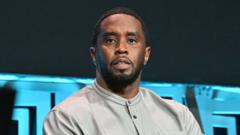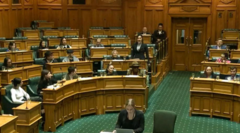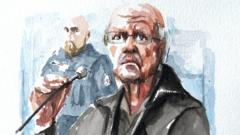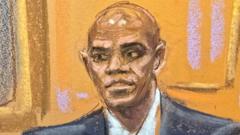The murder of Brian Thompson, CEO of UnitedHealthcare, has ignited a wave of anger towards the American healthcare system, reflecting a growing resentment over insurance practices and high medical costs. The incident revealed deep-seated frustrations as citizens shared personal stories of denied claims, highlighting a crisis felt nationwide.
Trigger Point: CEO’s Death Sparks Nationwide Outcry Against Healthcare System
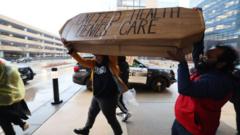
Trigger Point: CEO’s Death Sparks Nationwide Outcry Against Healthcare System
The assassination of a top insurance executive shines light on the escalating frustration many Americans harbor towards a convoluted healthcare system riddled with cost issues and coverage denials.
The shocking and targeted murder of UnitedHealthcare CEO Brian Thompson outside a New York hotel has rippled through America, revealing a tempest of anger aimed at the healthcare system. Following the crime, which has left police searching for a suspect, many citizens have expressed their grievances about the billion-dollar healthcare industry. The phrase "prior authorization," relatively obscure just months ago, has now become a rallying cry for those protesting against the insurance company’s denial of claims.
In July, activists from across the country converged on the Minnesota headquarters of UnitedHealthcare demanding accountability, resulting in eleven arrests during a road blockade. Unai Montes-Irueste, who directs media strategy for the People's Action Institute, noted that the demonstrators often had personal experiences with insurance difficulties and grievances concerning denied healthcare coverage.
The brutal nature of Thompson's death has intensified the discourse surrounding healthcare frustrations in the U.S. UnitedHealthcare, a powerhouse in the healthcare landscape, has faced accusations of denying essential treatments and putting profits above patients. Messages discovered on evidence from the killing, such as the words "deny" and "defend," may symbolize the very tactics that have incited public outrage against the insurance industry.
Thompson’s widow revealed that her husband had received threats prior to his murder, underscoring the risks faced by executives in this charged climate. Philip Klein, a security expert, noted a surge in fears among corporate leaders, advising them to prioritize personal security.
UnitedHealthcare’s leadership expressed sorrow over Thompson's death, describing him as a loving father and dedicated colleague. Yet, many online reactions, including comments from patients disillusioned by insurance policies, reveal a more critical sentiment. Some individuals even expressed no sympathy towards Thompson, further illustrating the divide in public attitudes.
The outrage has transcended political affiliations, as frustration over high healthcare costs and the complex insurance landscape resonates across diverse groups. Experts have pointed to America’s fragmented healthcare system as the root of these strong emotions. Recent research indicates a significant percentage of insured adults have faced out-of-pocket expenses for services they believed would be covered.
As the fallout continues, the rising cost of healthcare remains a dire concern. With insurance premiums averaging around $25,000 for families, and numerous individuals reporting struggles with medical debt, the landscape of American healthcare may be due for reevaluation. The tragic killing of a corporate leader has, however inadvertently, cast a glaring spotlight on these systemic issues that affect millions across the nation.


